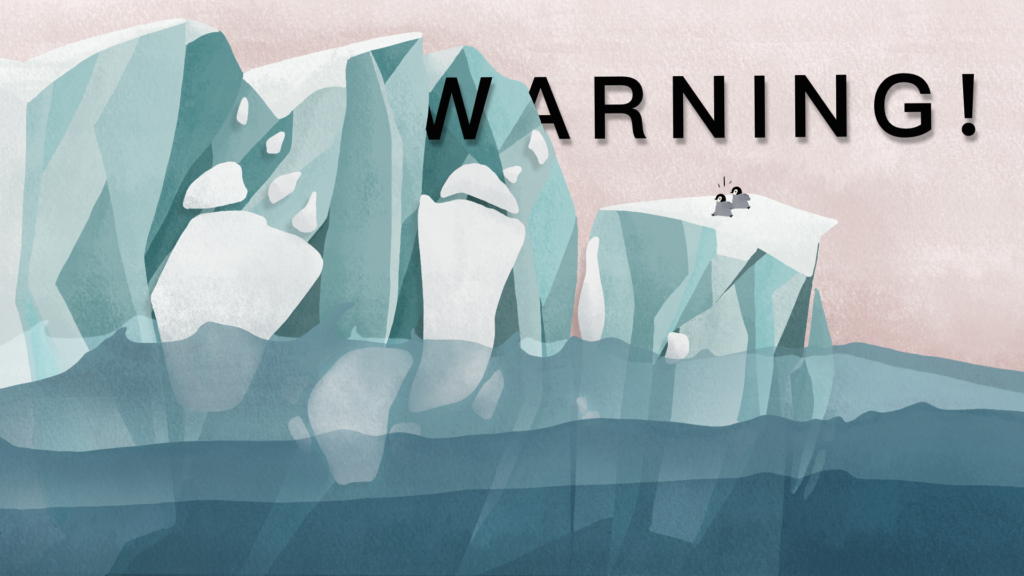What a recent ice shelf’s collapse means for the planet
Around March 15, an ice shelf collapsed in East Antarctica and climate change experts are concerned.
The ice shelf was about the size of New York City and this is the first time an ice shelf has collapsed in East Antarctica, according to pbs.org.
According to Christopher Gabler, an assistant professor for the University of Texas Rio Grande Valley’s School of Science, Earth, Environmental and Marine Science whose area of expertise includes climate change, “These shelves are melting in places that they don’t normally because of our rising global temperatures. We are experiencing a process of global warming … We don’t have to say, ‘Oh, it’s going to happen in the future,’ because we already recorded it.” Gabler also works in the department of biology at UTRGV.
Gabler said it is not the temperature itself that is the issue. It is the rate at which the temperature increases.
“The really scary part that has so many scientists like myself really concerned is that the rate the temperature has gone up is way faster than anything we ever saw before in the geologic record,” he said.
The ice shelf collapse also causes rising sea levels, which Gabler said is hugely important to the South Texas region. Since the ice melts into bodies of water, sea level increases, which will cause more storms.
“These storms are more likely to impact us,” he said. “Brownsville and Edinburg are close enough to the coast to be impacted by hurricanes, for example, and we’re mainly at risk due to wind and rainfall.”
As those storms get progressively more intense, the region’s flood risk increases as well. Gabler said the region’s economy will also be affected.
“Being in South Texas, even if you don’t live in Brownsville, a lot of our local economy is based on ecotourism and the coastal resources of the Lower Laguna Madre and South Padre Island. Even things like bird and butterfly watching are driven by the coastal health around here,” he said.
It is not only South Texas or Antarctica that should be worried about climate change though. Gabler said that the entire planet is at risk if climate change continues to melt giant ice formations.

Gabler said as the world’s snow and ice melt, the planet’s albedo lessens. The albedo refers to how reflective the planet is as a surface. The more reflective the planet is, the less energy it absorbs from the sun. If Earth becomes less reflective, it absorbs more energy from the sun, producing more heat. That heat will melt more snow and ice, causing a positive feedback loop.
“This is one of the dangers we’ve warned about—a runaway feedback loop or a positive feedback loop where climate change happens, and it changes something about the planet that makes climate change happen even worse,” he said.
All of this means that climate change is not a future concern, the assistant professor said.
“It’s already here. It’s already happening. More and more people are taking notice because the effects we’re seeing are getting bad enough that regular people notice it. You don’t have to be a scientist anymore to be able to feel and perceive and notice the effects of climate change that are already happening every day,” he said.
To emphasize the effects occurring in the present, some people refer to climate change as “the climate crisis,” Gabler said, and the challenge regarding the climate crisis is now “limiting how bad it gets.”
Nevertheless, there are some ways people can reduce their carbon footprints, such as driving and flying less, eating a more plant-based diet, avoiding beef and lamb, which have high carbon footprints, and reducing energy consumption in households. However, Gabler said action from corporations and governments is key.
“We need to tell our governments we need to invest more in renewable energy. We need to rely less on fossil fuels. We need to move towards policy and laws that reward sustainable energy production,” he said.
Gabler added one way that consumers can help is by informing themselves on which companies further endanger the environment and boycotting them.
“We need to say, ‘I’m not going to buy products from a certain company that is having devastating impacts on our environment, in our atmosphere and are going against the direction we need to be in terms of mitigating climate change.’”
He said it is only through action from corporations and government will the climate crisis be mitigated.
“We can be saints and we can be ultra-conservationists ourselves, but if corporations and governments are still burning coal, that doesn’t solve the problem.”
If the climate crisis is going to be mitigated, action is needed now, Gabler said.
“We have to act yesterday,” he emphasized. “We don’t have time to wait. Every day we delay makes things worse down the road.





